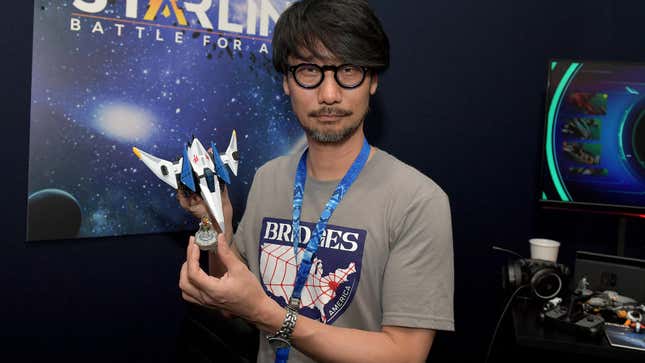
Those well-versed in their Metal Gear Solid trivia will know that the original ending for Metal Gear Solid 2 was changed before release. Scenes involving a massive ship crashing into Manhattan island were a bit too much in a very young post-9/11 world, with images and videos of planes striking the World Trade Center a constant in the media. In a recent interview, director Hideo Kojima talked about the complicated nature of releasing such a game after a world changing event and how it nearly drove him to quit Konami.
Metal Gear Solid 2: Sons of Liberty released in November of 2001 to much anticipation. As a series focused on “Tactical Espionage Action,” the games have never shied away from political themes, be they a part of the fictional story or commentaries on world events and history. While it’s been known for some time now that elements of the game were changed at the last minute due to the September 11 attacks, recent comments reveal that the stress and challenge of handling such a release were enough to push Hideo Kojima to quit Konami at the time. A conversation with Konami’s chairman, Kagemasa Kozuki was what convinced Kojima to stay back then.
Read More: Metal Gear Solid 2 Retrospective: Be Careful What You Wish For
Speaking with Shuka Yamada for IGN, Hideo Kojima described an awkward and tough situation after Metal Gear Solid 2, due to release in the Fall of 2001, contained images of the World Trade Center and other sites that were attacked on 9/11.
9/11 took place in 2001 right before the release of Metal Gear Solid 2. We’d just sent off the master, but the game featured both the World Trade Center and the Pentagon. It seemed impossible to release the game. I was called to the board of directors and they all turned pale when I explained the situation. Nobody would tell me what to do, with the exception of Mr. Kozuki, who tackled the issue.
As I thought about what to do, I went to speak with Mr. Kozuki about possibly quitting the company. That’s when he told me: ‘When this game comes out and society has their say about it, they’ll be talking about you, its creator, and me, the person who sold it. I doubt they’ll say anything about anyone else. What will you do? I’m ready for whatever happens.’
When I heard how far he was willing to go, I made the firm decision that we’d release it together. The rest is history.
MGS2 would go on to receive critical acclaim. The game’s tactical stealth gameplay was a dramatic evolution of what came before it and its meta-narrative filled with postmodern themes about digital information, virtual realities, among many others, is still relevant and widely discussed.
After MGS2 shipped, Kojima found himself in dire need of recovery. “I became completely exhausted, and I always end up in an awful state when I finish making a game,” he said. “After the first Metal Gear Solid, even after it was done I wasn’t recovering at all and ended up being passed from one hospital to the next.”
9/11 and the themes of Metal Gear Solid 2 weren’t the only time Kojima would face the need to alter his work. As we found out during The Game Awards this year, Kojima rewrote the original story for the sequel to the narrative-driven, post-apocalyptic delivery-service simulator, Death Stranding; the game’s themes of loneliness, isolation, and world-altering events were too close to what we all went through (and are still struggling with). The Covid-19 pandemic followed Death Stranding’s 2019 release by only a few months.
“Fiction changes when something that big happens,” Kojima told IGN. He continued:
That’s why I completely rewrote [Death Stranding 2]. You can’t pretend that something this big never happened. While the games themselves are based on characters who are not bound by our reality, the players themselves have gone through the pandemic, and a story written before that experience just wouldn’t resonate with them in the same way, whether it was a fantasy story or a sci-fi one.
Kojima Productions is currently working on Death Stranding 2. The company is also working on an unnamed game with Microsoft, a project Kojima says other publishers turned down; though he pitched the idea to a few places, he describes the game as requiring “infrastructure that was never needed before.” Other companies seemed to not be as into the idea, “they really seemed to think I was mad.”
Whatever that new game is, let’s hope he’s not predicting an awful future for us yet again.

